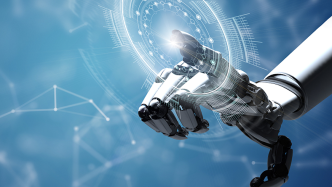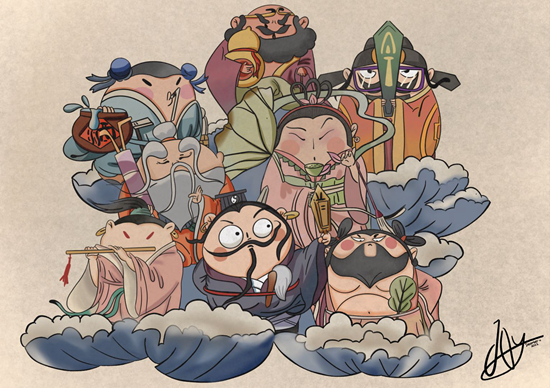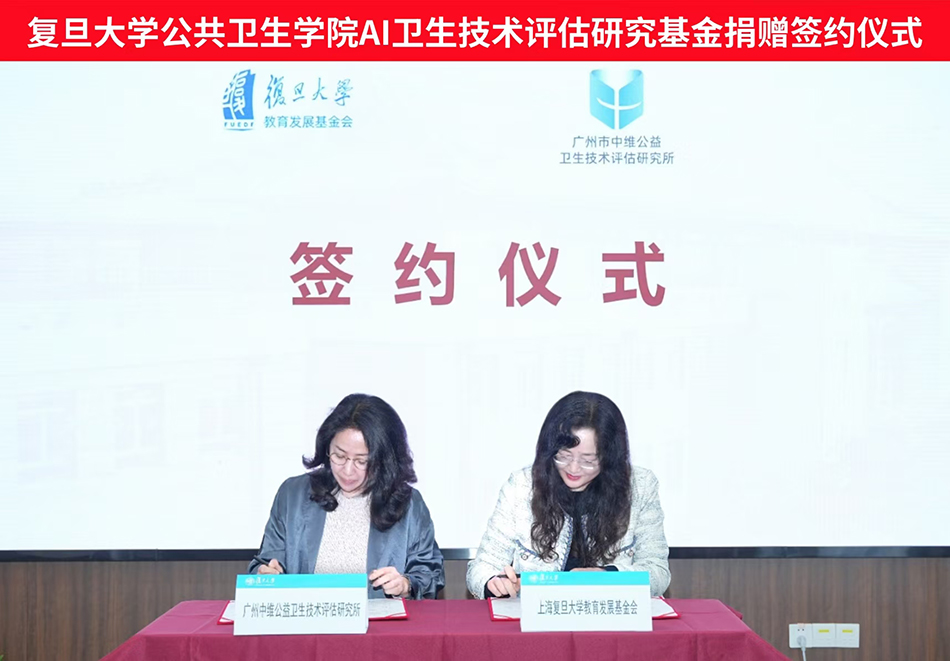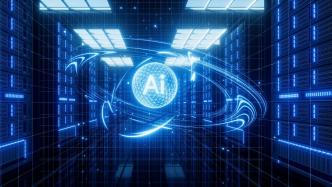

The daughter of Yu Wenxuan, dean of Xiamen University's School of Public Affairs, used an iPad to complete the painting in one night. Photo provided by the interviewee

Yu Wenxuan, dean of the School of Public Affairs at Xiamen University, spent several days drawing the painting with a brush and meticulous painting techniques. Photo provided by the interviewee

Compared with the computing power of the fourth-generation ChatGPT (represented by a circle), the current computing power of the third-generation ChatGPT is just a small black spot, just like the tiny earth in front of the sun. Photo provided by the interviewee
Liu Lei, a professor at the School of Public Administration of China University of Mining and Technology, became interested in the field of artificial intelligence last year and bought four or five books related to artificial intelligence. She remembered that a newly published book mentioned that it may be a long time before the development of special-purpose artificial intelligence technology such as AlphaGo to the generation of general-purpose artificial intelligence.
Looking at it now, such predictions obviously underestimate the speed of development of artificial intelligence.
A few years ago, artificial intelligence technology was ridiculed by netizens as "artificial mental retardation", and ChatGPT, which was born at the end of last year, captured 100 million active users in just two months, allowing people to re-understand what "artificial intelligence" is: an American The professor assigned the students to write papers, and the paper with the highest score was clear and well-reasoned, but it turned out to be written by ChatGPT; the reporter asked ChatGPT to help write the papers, and it could write three papers in ten minutes, and the papers were well-written... Latest According to the news, ChatGPT has become the author or co-author of at least 200 books in the Amazon Web Bookstore.
People talk about ChatGPT like a real "person", talking about what industry it will take away jobs, and whether it will control human beings. Recently, the Zhou Enlai School of Government and Management of Nankai University, the School of Public Affairs of Xiamen University, and the editorial department of the Journal of Guangxi Normal University co-sponsored a seminar on "New Generation Artificial Intelligence Technology (ChatGPT) and Public Management Education and Practice". At the meeting, more than a dozen public management experts talked about ChatGPT's challenges to future education, employment, and technology ethics.
Behind the explosion of ChatGPT, the theory of technology out of control attracts attention again
In Liu Lei's description, ChatGPT seems like a real person. It seems to be always humble, patient, and omniscient. It is also very good at pleasing humans, and even seems a little "greasy". But she couldn't help but reflect: "Is it a good thing if we have such a (omniscient) friend by our side? He can answer all kinds of questions when we need it, will it make us stupid? ?”
Such concerns are not the first to arise.
Liu Lei mentioned that as early as the search engine Google appeared, some people proposed the "Google effect": people regard the Internet as a part of memory storage, so they no longer remember those knowledge. "But how can you be creative if you don't have a certain accumulation of knowledge?"
Liu Lei is worried that after the emergence of ChatGPT, it may not only weaken people's memory ability, but even have a certain impact on people's decision-making ability. Emotional control, problem-solving planning, word creation, etc."
Yan Changwu, a professor at the School of Public Administration of Jinan University, believes that our world is becoming more and more technological, and ChatGPT is a sign of the latest development stage of technology. At the same time, human beings are faced with an unavoidable question: Will technology get out of control?
Yan Changwu said: "Technology has begun to become an autonomous force. It not only wants to get rid of human control, but even controls human beings in reverse, just like the 'robots control human beings' mentioned in many science fiction movies-this is actually a metaphor. This The inner core of the metaphor is that the world is respecting the laws of technology’s own development, just as we cannot travel without smartphones today.”
The general public apparently doesn't think that much when using AI products.
Meng Tianguang, a professor at the School of Social Sciences of Tsinghua University, conducted an empirical survey to analyze the general public's understanding of artificial intelligence technology. In 2021, his team conducted more than 2,000 questionnaires in various provinces across the country, and also collected data from social media such as Weibo over the past year.
It was found that when the public uses or purchases AI applications such as smart access control and smart home, they basically pay attention to two aspects. One is to have high cost performance; the other is to protect information. Among the public's ethical concerns about artificial intelligence, privacy and security issues rank first, followed by data fairness.
Issues such as human autonomy that scholars care about are far from being considered by the public.
Machines replaced human limbs in the past, and will partially replace the brain in the future
Whenever there is a major technological breakthrough, an unavoidable question is: Will it replace humans?
In some fields, AI without emotion is more competent than humans who are "always taking chances, wanting to avoid responsibility, and limited brain capacity".
Rong Zhi, a professor at the School of Politics and Public Administration of Wuhan University, said that when dealing with emergencies, there may be problems such as missed reports, late reports, and concealed reports, and they may also ignore risks and have a fluke mentality. These problems have restricted the level of emergency management. .
He said that in the field of emergency management, there are many application scenarios of artificial intelligence. For example, in the prevention stage, the precise perception ability of artificial intelligence is continuously improved, and the ability to collect and integrate information is continuously enhanced. On this basis, the ability of artificial intelligence to monitor and warn of danger has also been improved. After the training of specific algorithms and data to form a model, AI can improve its predictive capabilities, such as predicting natural disasters and forest fire risks. American scientists have even introduced artificial intelligence technology in the fields of predicting violent crimes and social security.
After a disaster occurs, artificial intelligence technology can also assist in decision-making, and generate the most efficient rescue route based on the disaster situation and resource distribution. In addition, there are a large number of robots and drones involved in emergency rescue. Rong Zhi believes that "the use of artificial intelligence has played a role in moving the gate forward and coordinating the linkage for the process reengineering and capacity improvement of emergency management."
In "The Second Machine Revolution," first published in 2014, authors Eric Bryan Joverson and Andrew McAfee argue that the Industrial Revolution, represented by the steam engine, was the first machine revolution, where machines Partially replaced the human body; now is ushering in the second machine revolution, the machine will partly replace the human brain.
Rong Zhi found that many people are discussing whether humans and artificial intelligence are substitutes. He quoted Voltaire as saying: "A person is judged by his ability to ask questions, not his ability to give them. At present, the ability to ask questions is precisely what artificial intelligence is difficult to have."
Ye Lin, a professor at the School of Politics and Public Affairs at Sun Yat-sen University, is most concerned about whether people can keep their jobs under the impact of artificial intelligence.
"In the past, we thought that a robot is an assembly line, a production line, which replaces physical labor. Now it may even replace mental labor." Ye Lin even thinks that college teachers are also on the list of being replaced by AI.
Ye Lin believes that the substitution effect of artificial intelligence will cause some serious unemployment problems, and some jobs will disappear. At the same time, some new positions may also appear, such as artificial intelligence trainers, positions for operating AI, etc., and a large number of modern industrial technical personnel who master theoretical technology and intelligent technology are also needed.
AI reconstructs the classroom, and future education will turn to interactive training
Many scholars agree that ChatGPT will have a profound impact on the field of education.
Wu Xiaolin, a professor at the Zhou Enlai School of Government and Management at Nankai University, found that in a global survey, more than 89% of the interviewed students used ChatGPT to complete homework, 53% of the interviewed students used it to write papers, and 22% of the interviewed students used it to Generate a thesis outline.
"So facing the future, where should postgraduate education go?" Wu Xiaolin said.
He believes that artificial intelligence has three functions of replacing the existing postgraduate education model: classroom replacement, the previous courses are completed in the classroom, and future education may combine virtual reality, no longer limited to classroom scenarios; teacher replacement, artificial intelligence It will play an increasing role in correcting homework, collecting information, and transmitting knowledge; instead of evaluation, the evaluation methods for postgraduates today are mainly papers and assignments, which have the characteristics of standardization and process.
But Wu Xiaolin is not pessimistic about the future: "Although artificial intelligence looks intelligent, at present, it is basically a piece of knowledge integration, which cannot represent deep thinking and innovation. Therefore, this is the goal of our future education reform. direction."
Wu Xiaolin believes that it is necessary to use interactive training to solve the dilemma of the assembly line and guide students to understand and in-depth learning; It is necessary to use ideological education to lead students to transcend technical limitations, learn to ask good questions, pay attention to logic, and identify useful information.
Zhang Zhihong, an associate professor at the Zhou Enlai School of Government Administration of Nankai University, is a "technologist" who likes to try new technologies. She believes that it is necessary to better "domesticate" AI and let it become a teacher's assistant; and with the development of AI technology, the role of teachers will also change. There will be a change where the teacher becomes the director of the teaching activity and the student becomes the protagonist.
She said: "The acquisition of knowledge and capabilities in the future will focus more on how to construct problems and the value reconstruction behind them."
While domesticating AI, people are also being "domesticated" by technology
"What does a technological 'hurricane' like ChatGPT mean to us? What does it mean to our society? I think the core behind it is that technology, technological rights and our social rights Relationship issues.” Yuan Fangcheng, a professor at the School of Politics and International Relations at Central China Normal University, said, “As technology (development) improves, many people are unemployed. To what extent can these unemployed groups obtain opportunities for development, employment, and re-education Chance?"
The development of ChatGPT is still accelerating.
In this seminar, Professor Yu Wenxuan, Dean of the School of Public Affairs of Xiamen University, presented two comparison charts: compared with the computing power of the fourth-generation ChatGPT (represented by a circle), and the current computing power of the third-generation ChatGPT It's just a small black spot, like the tiny earth in front of the sun.
Yu Wenxuan said that the big language model is a perfect combination of "linguistics and computer engineering", and its logic is to imitate and infinitely approach the process of people acquiring knowledge and developing language. Some foreign studies have shown that ChatGPT has demonstrated its potential to "grasp statistical laws, have reasoning ability and show basic human emotions".
He said that the current research and use of artificial intelligence in the public management academic circle is basically based on existing artificial intelligence technologies and products. The emergence of ChatGPT has epoch-making significance. The public management academic circle needs to update our understanding of artificial intelligence and artificial intelligence. Understanding and thinking about the challenges that intelligence brings to us.
In fact, when people domesticate "AI", they are also unconsciously "domesticated" by technology.
On the same day, Yu Wenxuan showed the participants two works that he and his daughter, who was in junior high school, copied from the same online art work. Yu Wenxuan's works are drawn by him over several days with a brush and meticulous painting techniques. My daughter's work was completed in one night using an iPad.
Yu Wenxuan put the two paintings side by side and asked the participants which one they liked better. My daughter's works have smooth lines, accurate shapes, and bright and clear colors. Yu Wenxuan's works have jerky lines, dull colors and uneven paper.
He has conducted tests on different occasions, and most people will choose electric painting works, but from the perspective of Chinese painting art, Yu Wenxuan's works are more humane and artistic.
"Most people choose her paintings because they don't realize that our views on beauty have actually been domesticated by modern science. Human hand-drawing techniques are rough and inferior in front of information technology." Yu Wenxuan said , The development of modern technology has changed our cognition and views on people and "human nature". He also expressed his concern about the impact of the development of artificial intelligence technology on humanities and art in the future.


